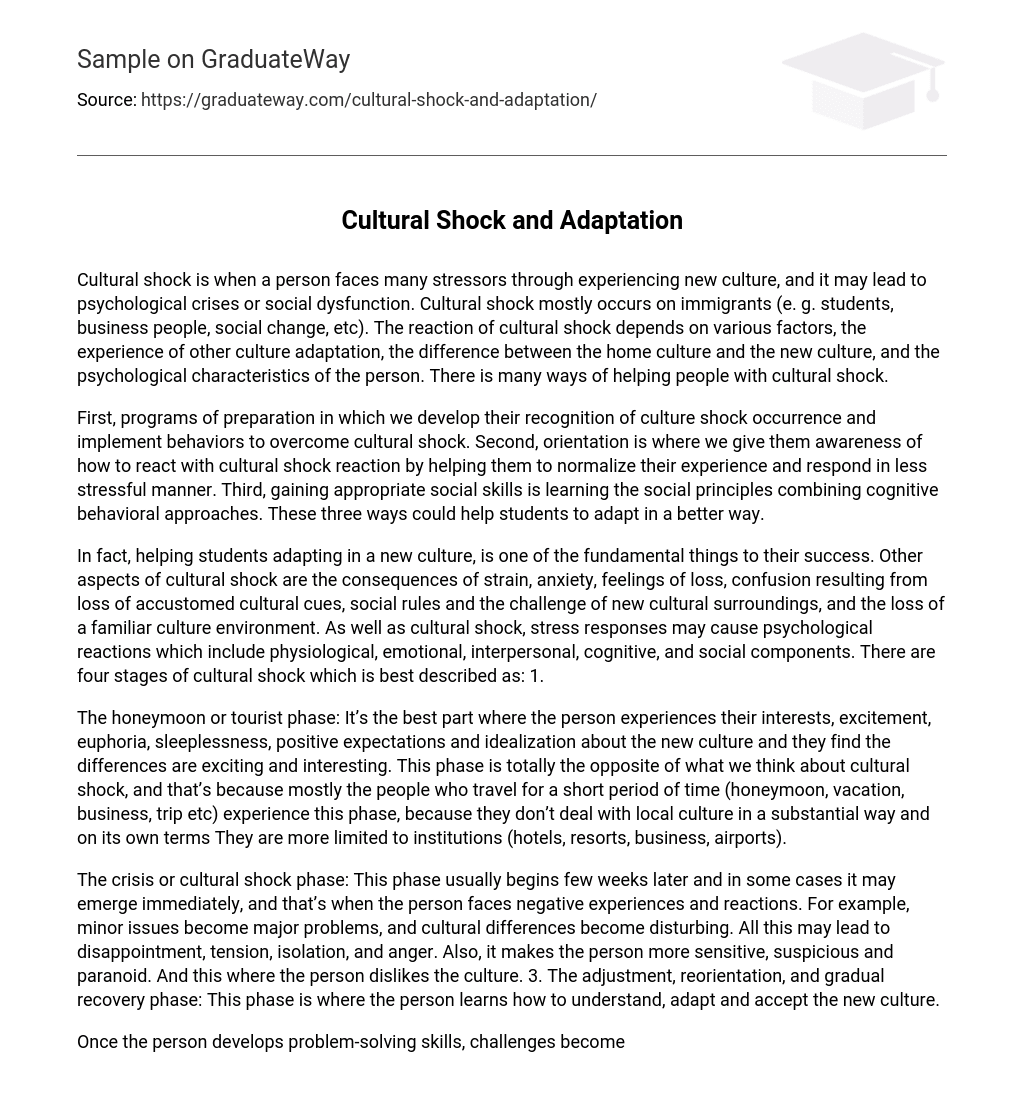Cultural shock is the experience of encountering numerous stressors when individuals are exposed to a new culture. It can lead to psychological crises or social dysfunction. Immigrants, including students, businesspeople, and those experiencing social change, are especially vulnerable to cultural shock. The response to cultural shock varies depending on factors like prior experience in adapting to different cultures, differences between one’s home culture and the new culture, and an individual’s psychological traits. Thankfully, there are several ways to support individuals facing cultural shock.
Firstly, there are programs specifically designed to prepare individuals for culture shock. These programs aim to enhance their recognition of culture shock and teach them strategies to overcome it.
Secondly, orientation plays a key role in creating awareness about how to react when confronted with cultural shock. The goal is to help individuals normalize their experience and respond in a less stressful manner.
Lastly, gaining suitable social skills involves learning the principles of social interaction through cognitive behavioral approaches. By employing these three methods, students can adjust more effectively to new cultural environments.
Assisting students in adapting to a new culture is crucial for their achievement. Cultural shock encompasses tension, uneasiness, disorientation, and perplexity caused by the absence of familiar cultural cues and social norms, as well as the difficulty of adjusting to a different cultural atmosphere. This can result in the loss of a familiar cultural context. Moreover, stress reactions may manifest in diverse psychological responses such as physiological, emotional, interpersonal, cognitive, and social aspects. The four stages of cultural shock can be described as follows: 1.
During the honeymoon or tourist phase, individuals go through a range of positive emotions and behaviors associated with their new culture. This includes interests, excitement, euphoria, sleeplessness, positive expectations, and idealization. They find the differences in the culture exciting and interesting. Unlike what we usually think of as cultural shock, this phase is the opposite. It is mainly experienced by individuals who travel for short periods of time like honeymoons, vacations, business trips etc. These individuals do not fully engage with the local culture on its own terms but instead have limited interactions with institutions such as hotels, resorts, businesses and airports.
The crisis or cultural shock phase typically occurs within a few weeks after arrival, although in certain cases it may happen immediately. This phase involves individuals experiencing negative experiences and reactions, with minor issues becoming more significant and cultural differences causing distress. These factors can lead to feelings of disappointment, tension, isolation, and anger. Additionally, individuals may become more sensitive, suspicious, and paranoid, resulting in a dislike for the new culture.
The adjustment, reorientation, and gradual recovery phase takes place as individuals learn to comprehend, adapt to, and embrace the new culture.
When individuals develop problem-solving skills, they start to find joy in challenges and approach their problems positively. This leads to a decrease in negative reactions and responses. The adaptation phase involves successfully adjusting to a new culture, learning how to address problems, and taking responsibility. Cultural shock can be triggered by stress, resulting in heightened physiological reactions and potential dysfunction in pituitary-adrenal activity. Stress also contributes to increased feelings of anxiety and depression.
Cognitive fatigue is the result of having to exert significant effort to learn and understand new cultural information and meet new demands. Role shock occurs when individuals experience a sense of identity loss due to changes in their social roles and interpersonal relationships. Personal shock is a form of cultural shock stemming from various changes in one’s personal life. Symptoms of cultural shock can manifest as excessive sleep, compulsive eating and drinking, and decreased work productivity.
Winkelman, M. (1994) mentions in the Journal of Counseling and Development : JCD that cultural shock and adaptation are closely related (pp. 121-126).





